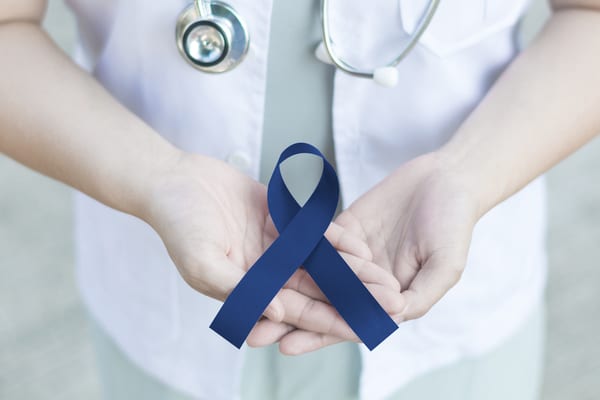March is Colorectal Cancer Awareness Month, and there are some important, and yet simple things you can do to raise awareness and take action toward prevention.
The Bad News
Colorectal cancer is the third most common cancer in the United States and the second leading cause of death from cancers that affect both men and women. It affects people in all racial and ethnic groups and is most common in people age 50 and older.
Risk Factors
Some of the leading risk factors to getting colorectal cancer are:
- Being over 50 years old.
- Use of alcohol and tobacco.
- Lack of physical exercise.
- Low-fiber diet.
- Personal history of inflammatory intestinal conditions.
- Family history of colon cancer.
Signs and Symptoms
Colorectal polyps (abnormal growths in the colon or rectum that can turn into cancer if not removed) and colorectal cancer don’t always cause symptoms, especially at first. Someone could have polyps or colorectal cancer and not know it. That’s why getting screened regularly for colorectal cancer is so important.
According to the CDC, symptoms include:
- A change in bowel habits.
- Blood in or on your stool (bowel movement).
- Diarrhea, constipation, or feeling that the bowel does not empty all the way.
- Abdominal pain, aches, or cramps that don’t go away.
- Weight loss and you don’t know why.
If you have any of these symptoms, make an appointment with your doctor. They may be caused by something other than cancer. The only way to know what is causing them is to see your doctor.
Yes, there IS Good News
If everyone age 50 and older got regular screenings, 6 out of 10 deaths from colorectal cancer could be prevented. Communities, health professionals, and families can work together to encourage people to get screened.
Get Involved and Spread the Word
Use this month to make a difference. Communities, organizations, families, and individuals can get involved and spread the word.
Here are just a few ideas:
- Encourage families to get active together – physical activity may help reduce the risk of colorectal cancer.
- Talk to family, friends, and people in your community about the importance of getting screened for colorectal cancer starting at age 50.
- Ask doctors and nurses to talk to patients age 50 and older about the importance of getting screened.
—
Photo Credit: BlurryMe / Shutterstock.com
